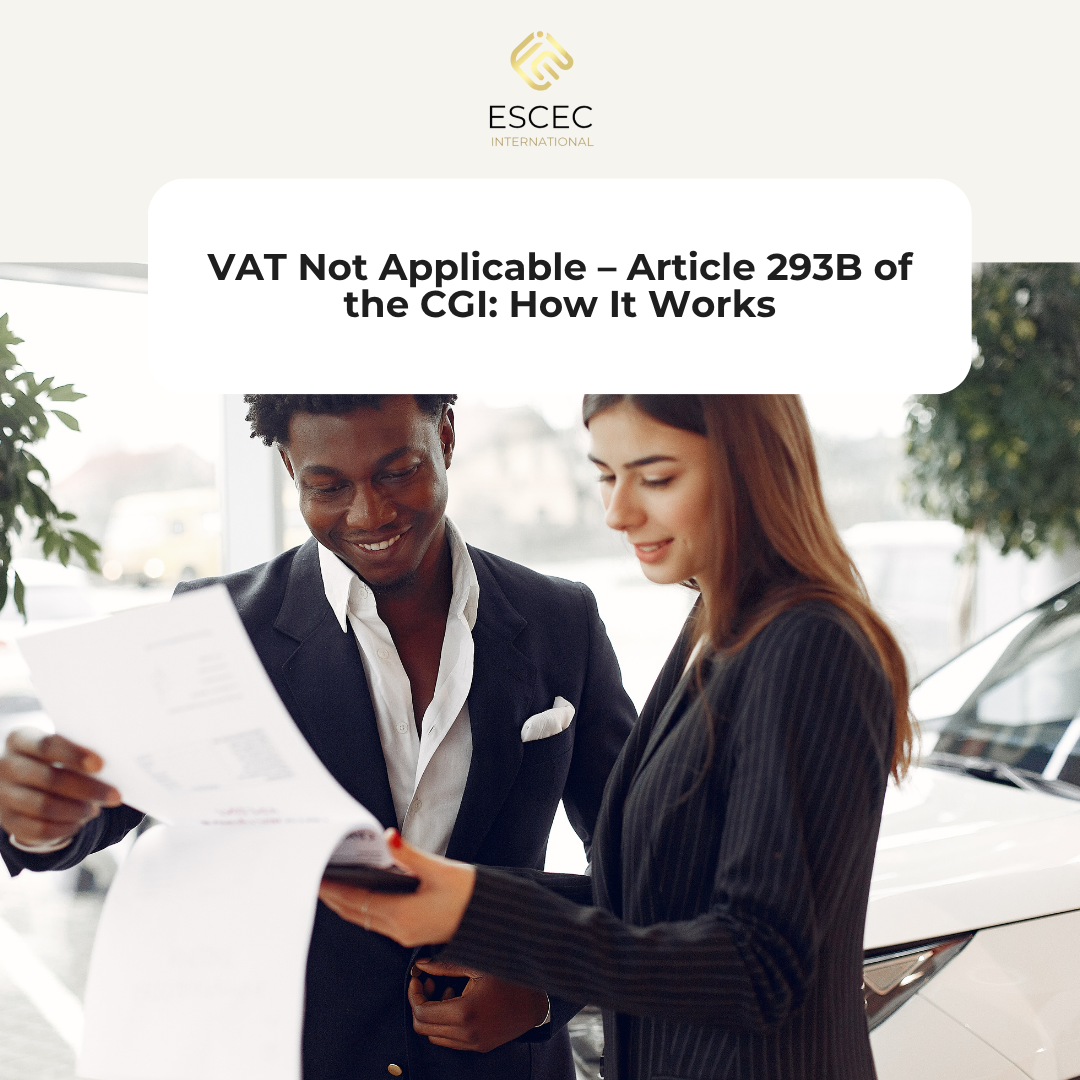VAT Not Applicable – Article 293B of the CGI: How It Works
The VAT exemption scheme allows eligible professionals to be exempt from VAT declaration and payment. This exemption is governed by Article 293B of the French General Tax Code (CGI), which is why invoices often include the note: “VAT not applicable – Article 293B of the CGI.”
Who can benefit from this regime? What are the conditions, and what happens if revenue exceeds the thresholds? Here is everything you need to know about VAT not applicable under Article 293B of the CGI.
What is VAT Not Applicable Under Article 293B of the CGI?
VAT Not Applicable or VAT Exemption?
The term “VAT not applicable” refers to the application of the VAT exemption scheme by the invoicing company.
This scheme allows businesses below a certain annual turnover to not charge or collect VAT.
Practically, businesses invoice their clients excluding VAT (HT) and cannot reclaim VAT on their own purchases. Therefore, under Article 293B of the CGI, VAT is only recorded as a cost, not recoverable.
☝️ Note: VAT exemption applies automatically to companies that do not exceed the legal thresholds, including self-employed entrepreneurs. That is why the note “VAT not applicable – Article 293B of the CGI” is common.
What is Article 293B of the CGI?
Article 293B of the French General Tax Code (CGI) establishes the VAT exemption regime, allowing companies meeting certain conditions to be exempt from VAT declaration and payment.
This regime targets businesses whose annual turnover does not exceed specified limits, simplifying accounting and reducing administrative burdens for small businesses, artisans, professionals, and self-employed individuals.
Conditions for VAT Not Applicable (Article 293B of the CGI)
To benefit from VAT not applicable under Article 293B of the CGI, annual turnover must not exceed specific thresholds, depending on the activity type.
Note: For micro-entrepreneurs, VAT exemption is the default regime as long as their turnover remains under the thresholds.
Commercial and Accommodation Activities
- Base threshold: €85,000 HT
- Upper threshold: €93,500 HT
Since January 1, 2025, the tolerance period has been removed:
- If turnover exceeds €85,000, VAT applies from January 1 of the following year.
- If turnover exceeds €93,500, VAT applies immediately.
| Turnover Condition | VAT Exemption Eligible? |
|---|---|
| > €93,500 | No |
| €85,000–€93,500 | Yes, until January 1 following year |
| < €85,000 | Yes |
Note: Article 293B applies to artisans, traders, and hoteliers.
Service Providers
- Base threshold: €37,500 HT
- Upper threshold: €41,250 HT
Since January 1, 2025, the tolerance period no longer exists:
- If turnover exceeds €37,500, VAT applies from January 1 of the next year.
- If turnover exceeds €41,250, VAT applies immediately.
| Turnover Condition | VAT Exemption Eligible? |
|---|---|
| > €41,250 | No |
| €37,500–€41,250 | Yes, until January 1 following year |
| < €37,500 | Yes |
Liberal Professions
Article 293B distinguishes lawyers from other liberal professions:
- Lawyers: threshold €50,000 HT
- Other liberal professions: same thresholds as service providers (€37,500 HT)
Authors and Performing Artists
Authors and performing artists can benefit from Article 293B if their annual turnover does not exceed €50,000 HT.
What Happens if the Thresholds Are Exceeded?
Since January 1, 2025, there is no tolerance period.
If turnover exceeds the base or upper thresholds:
- You must charge VAT from the first day of the month of exceedance or January 1 of the following year.
- You can deduct VAT paid on business purchases.
Note: If you issued invoices without VAT for services after exceeding the threshold, you must issue corrected invoices including VAT.
How to Exit the VAT Exemption Regime (Article 293B)
Apart from exceeding thresholds, businesses can voluntarily opt out of the VAT exemption regime.
You can choose to pay VAT under either the simplified VAT scheme or the standard VAT scheme.
- Option applies from the first day of the month of request
- Valid for 2 years, automatically renewed
- You may revert to exemption if turnover limits are respected, unless you benefited from a VAT credit during the period
💡 Tip: For more information, see our guide on VAT declaration.
Billing under VAT Not Applicable (Article 293B)
Invoices issued under this regime must include:
“VAT not applicable – Article 293B of the CGI” (or optionally “VAT not applicable – Article 293B autoliquidation”).
- Always invoice HT, whether for goods or services
- VAT cannot be recovered on business purchases
The regime simplifies accounting, eliminating VAT calculations and declarations.
Note: Tools like LS Compta can centralize invoices, track payments, and automate reminders.
FAQ
What is the VAT exemption scheme?
It is a fiscal regime that exempts professionals from charging VAT if turnover is below a specific limit. VAT on purchases cannot be reclaimed.
Can I refuse Article 293B?
Yes. Any professional may opt for a real VAT regime (simplified or standard). The option lasts 2 years and is renewed automatically unless a change is requested.
How to change VAT regime?
Request must be sent to the local tax office (SIE), preferably by registered mail with acknowledgment.
What does “VAT not applicable – Article 293B of the CGI” mean on an invoice?
It indicates the business applies the VAT exemption, invoicing excluding VAT.
Why don’t self-employed entrepreneurs charge VAT?
Most micro-entrepreneurs remain under the VAT exemption thresholds, so the note “VAT not applicable – Article 293B of the CGI” appears frequently.
Conclusion
The VAT exemption under Article 293B of the CGI simplifies tax obligations for small businesses, freelancers, and self-employed professionals, reducing administrative burden and offering fiscal flexibility.
👉 Need help applying Article 293B of the CGI to your business? ESCEC International can assist with VAT management and tax optimization.

